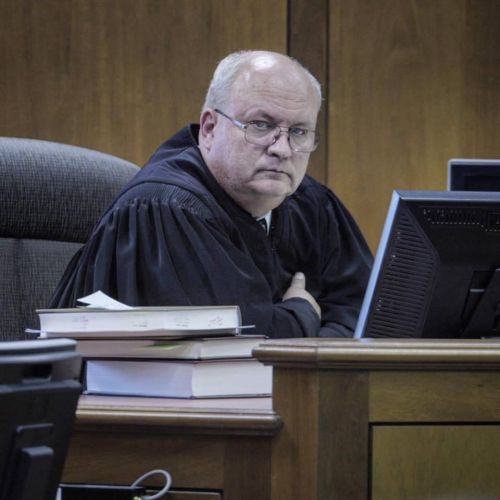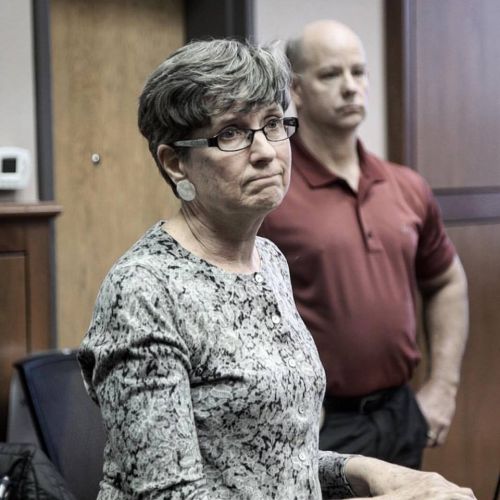News | November 4th, 2017
 MANDAN – Defense lawyers are whittling down the cases involved with the Dakota Access Pipeline controversy, but the sudden imprisonment of two last month came as a shock, and has activists wondering if the state is either being vindictive, or changing strategies.
MANDAN – Defense lawyers are whittling down the cases involved with the Dakota Access Pipeline controversy, but the sudden imprisonment of two last month came as a shock, and has activists wondering if the state is either being vindictive, or changing strategies.
“I was singled out among many who were unjustly arrested,” Alex Simon said.
Simon, 27, is a teacher from New Mexico and served 13 days of an 18-day sentence for locking arms with activists – known as water protectors – against a police line on October 22, 2016. That same day, 140 others were arrested with him, but only one other received a jail sentence: 65-year-old Mary Redway, a retired environmental planner from Rhode Island.
“I was shocked that he ordered us to jail immediately,” Redway said after she served four days inside the women's booking cellblock of the Burleigh Morton Detention Center. “We were shackled and led out of the courtroom as though it were a scene from a really bad movie. It was [Judge Thomas A.] Merrick’s way of saying ‘F*ck you.’”
“It seems that Judge Thomas A. Merrick wanted to make an example of me, berating me because, in his opinion, I didn’t ‘have a dog in the fight,’” Simon said. “He is mistaken, and I am proud to help shoulder the burden in the fight for Indigenous Rights. If this is the price I must pay for Indigenous Peoples to pursue a path towards sovereignty, I am honored to do it.”
Both Redway and Simon say they were treated decently while inside, surviving on a high-carbohydrate diet. Redway was treated with “kid’s gloves,” while Simon even made a few friends during his incarceration.

Redway said the booking guard refused to believe she was convicted and imprisoned on a disorderly conduct charge.
“I had to show him the court papers before he would change what he had typed in,” Redway said. “Then he muttered something to the effect that nobody gets jailed for disorderly conduct.”
So far, 310 cases for activists arrested during the Dakota Access Pipeline controversy have been dismissed or acquitted, 107 activists made plea deals, 24 cases have had pre-trial diversions, and one case has made an appeal to the North Dakota Supreme Court, according to Sarah K. Hogarth, communications director with the Water Protector Legal Collective. Another 109 cases are inactive, and 259 cases remain to be tried, calendared until July 2018.
A total of 761 people were arrested during the months-long opposition to the 1,172-mile-long Dakota Access Pipeline, according to Morton County Sheriff’s Department. The Water Protector Legal Collective reports 854 people were arrested.

Chase Iron Eyes, an attorney and registered member of the Standing Rock Sioux Tribe who ran against Congressman Kevin Cramer R-ND, last year, is one of those arrested and he’s still awaiting trial. He faces felony charges of inciting a riot, and plans to use the necessity defense, a tactic denied to valve turners in Pembina County by Judge Laurie A. Fontaine in early October.
Iron Eyes plans to argue that his crime, while he does not dispute his involvement, was justified because he committed them to prevent a greater harm. His case had a hearing on Friday to argue that his attorneys needed more time to gather evidence.
Iron Eyes also plans to challenge the “civil rights conspiracy” narrative that portrayed activists as terrorists, which resulted in harsh treatment.
“Radicalized capitalists are the terrorists,” Iron Eyes said in a Facebook post on Friday. “The unnatural outlier, the disease of all pursuits of life, liberty, happiness and spirit. Here they stand before God, criminalizing water protectors, privatizing water, preying on the impoverished, forcing a form of indentured servitude for capital exchange, committing genocide, and forcing people to kill each other for their own profits. Not in defense of land, water, people or even ‘country.’ We, sentient beings, are committing unforgivable murder on the innocent for their endless war machine, their death march.”
Redway is now out of jail, and is a volunteer with the Water Protector Legal Collective in Mandan. Despite the state’s poor conviction record, she is worried that state prosecutors, and state leaders, are changing tactics. Judge Merrick was one of the petitioners who attempted to change the Supreme Court law to stop out-of-state attorneys from defending primarily out-of-state defendants.
The petition failed after the North Dakota Supreme Court received 536 comments against changing the law.
On October 23, Cramer along with 80 colleagues petitioned US Attorney General Jeff Sessions to help prosecute “to the fullest extent of the law any criminal who try to destroy energy infrastructure.
“This is about right and wrong,” Cramer wrote. “As we’ve seen from the DAPL riots, environment terrorism – when left unchecked – sets a dangerous precedent that puts lives at risk and has resulted in major damage to private and public property.”
“We’ve seen the state change it’s strategy vis-a-vis prosecution tactics,” Redway said. “They really went to town on my trial with enhanced photos taken from helicopter footage to establish who was where, and when. There was nothing like this in any earlier trials, and they brought in new charges and a judge from the surrogate circuit who is vindictive and willing to twist the law. All new plays.
“The state has found its winning combination and will probably try to replicate it in future trials. Chilling. They may even recharge those who had their original two charges dropped, but haven’t yet gotten the new charges.”
Despite serving time behind bars, both Redway and Simon do not regret their actions.
“The movement for Indigenous Rights is so powerful because it is focused on healing historical and environmental trauma and it is being led by people whose ancestors were the original stewards of this land,” Simon said. “As a fellow human being a person who comes from Jewish descent, I am compelled to help alleviate suffering wherever it exists.”
 “Would I do it again?” Redway said. “To be clear: I had no intention of getting arrested that day. But I also believe, the judge’s verdict notwithstanding, that I did not break the law in any way. I do not regret my actions, despite having been convicted and sent to jail. I stand by my right to peaceably protest.”
“Would I do it again?” Redway said. “To be clear: I had no intention of getting arrested that day. But I also believe, the judge’s verdict notwithstanding, that I did not break the law in any way. I do not regret my actions, despite having been convicted and sent to jail. I stand by my right to peaceably protest.”
January 27th 2026
January 27th 2026
January 26th 2026
January 24th 2026
January 16th 2026
_(1)_(1)_(1)_(1)_(1)__293px-wide.jpg)


_(1)_(1)_(1)_(1)__293px-wide.jpg)
_(1)_(1)_(1)_(1)__293px-wide.jpg)
_(1)_(1)_(1)_(1)_(1)__293px-wide.jpg)